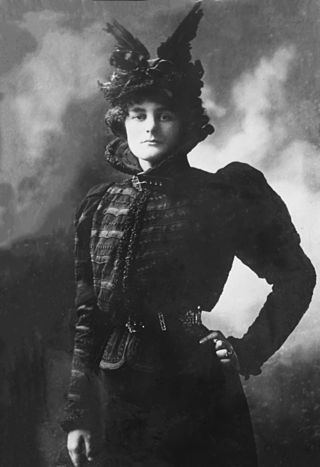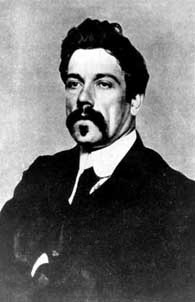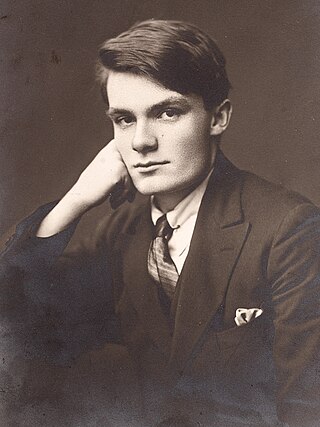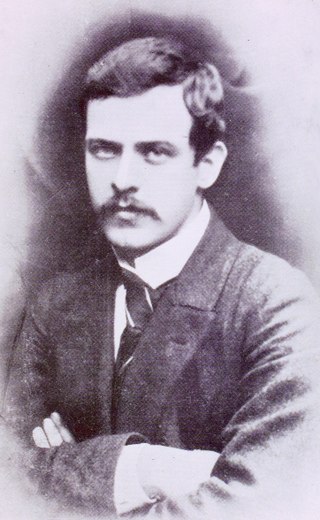
William Butler Yeats was an Irish poet, dramatist, writer and politician. One of the foremost figures of 20th-century literature, he was a driving force behind the Irish Literary Revival and became a pillar of the Irish literary establishment who helped to found the Abbey Theatre. In his later years, he served two terms as a Senator of the Irish Free State.

John MacBride was an Irish republican and military leader. He was executed by the British government for his participation in the 1916 Easter Rising in Dublin.

Arthur Joseph Griffith was an Irish writer, newspaper editor and politician who founded the political party Sinn Féin. He led the Irish delegation at the negotiations that produced the 1921 Anglo-Irish Treaty, and served as the president of Dáil Éireann from January 1922 until his death later in August.

Maud Gonne MacBride was an Irish republican revolutionary, suffragette and actress. She was of Anglo-Irish descent and was won over to Irish nationalism by the plight of people evicted in the Land Wars. She actively agitated for Home Rule and then for the republic declared in 1916. During the 1930s, as a founding member of the Social Credit Party, she promoted the distributive programme of C. H. Douglas. Gonne was well known for being the muse and long-time love interest of Irish poet W. B. Yeats.

Edmund John Millington Synge was an Irish playwright, poet, writer, collector of folklore, and a key figure in the Irish Literary Revival. His best known play The Playboy of the Western World was poorly received, due to its bleak ending, depiction of Irish peasants, and idealisation of parricide, leading to hostile audience reactions and riots in Dublin during its opening run at the Abbey Theatre, Dublin, which he had co-founded with W. B. Yeats and Lady Gregory. His other major works include In the Shadow of the Glen (1903), Riders to the Sea (1904), The Well of the Saints (1905), and The Tinker's Wedding (1909).
The Irish Literary Revival was a flowering of Irish literary talent in the late 19th and early 20th century. It includes works of poetry, music, art, and literature.

Padraic Colum was an Irish poet, novelist, dramatist, biographer, playwright, children's author and collector of folklore. He was one of the leading figures of the Irish Literary Revival.

Henry Francis Montgomery Stuart was an Irish writer. He was awarded one of the highest artistic accolades in Ireland, being elected a Saoi of Aosdána, before his death in 2000. His years in Nazi Germany led to a great deal of controversy.
Paul Durcan is a contemporary Irish poet.

Inghinidhe na hÉireann was a radical Irish nationalist women's organisation led and founded by Maud Gonne from 1900 to 1914, when it merged with the new Cumann na mBan.

Cathleen ni Houlihan is a one-act play written by William Butler Yeats and Lady Gregory in 1902. It was first performed on 2 April of that year and first published in the October number of Samhain. Lady Gregory wrote the naturalistic peasant dialogue of the Gillane family, while Yeats wrote Cathleen Ni Houlihan's dialogue.

Iseult Lucille Germaine Gonne was the daughter of the Irish republican revolutionary Maud Gonne and the French politician and journalist Lucien Millevoye. She married the novelist Francis Stuart in 1920.
Henry Dixon was an Irish republican. He was a member of several nineteenth-century nationalist societies, a founding member of Sinn Féin, and a director of the Sinn Féin Printing & Publishing Company.

William Rooney, also known as Fear na Muintire, was an Irish nationalist, journalist, poet and Gaelic revivalist. Along with Arthur Griffith and Denis Devereux he founded the Celtic Literary Society, and with Griffith founded the first Cumann na nGaedheal.

An Stad was a guest house located at 30 North Frederick Street, Rotunda, Dublin 1, which was frequented by notable historical figures, including Douglas Hyde, the first President of Ireland, Arthur Griffith, founder of Sinn Féin, author James Joyce, Gaelic Athletic Association (GAA) founder Michael Cusack, writer Brendan Behan and poet William Butler Yeats. It was a tobacco shop, guesthouse, restaurant and meeting place and its guests had wide-ranging influence over the Irish Nationalist movement, well-known works of literature and the development of Irish sport in the early 20th century. It has been located in various buildings on North Frederick Street, including 1B, 9 and 30 North Frederick street.

Máire Nic Shiubhlaigh was an Irish actress and republican activist. She started acting in her teens and appeared in the first Irish-language play performed in Ireland. She was a founder-member of the Abbey Theatre and was leading lady on its opening night in 1904, when she played the title role in W.B. Yeats's Cathleen Ni Houlihan. She later joined the Theatre of Ireland, which she helped to found.
Mary Barry O'Delaney was an Irish journalist and nationalist.
Helen Laird (1874–1957), was an Irish actress also known as ‘Honor Lavelle’, a costumier, teacher, and feminist.
Maire Quinn was an Irish actress and republican activist, and one of the founding members of the Irish National Theatre Society.












